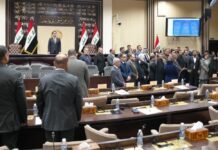Tishwash: Al-Sudani leaves Baghdad for the Netherlands on an official visit
Today, Thursday, Prime Minister Muhammad Shiaa Al-Sudani left the capital, Baghdad, heading to the Netherlands on an official visit.
A statement issued by the Prime Minister’s Media Office, received by Mawazine News, stated that “Prime Minister Muhammad Shiaa Al-Sudani left the capital, Baghdad, heading to the Netherlands.”
He pointed out that “the visit came after an official invitation from the Dutch side.” link
CandyKisses: Parliament or government? Who is responsible for amending the 2024 budget law?
Economy News – Baghdad
Today, Thursday, the Finance Committee clarified the powers of the federal government and the role of the House of Representatives in the current year’s budget.
A member of the parliamentary finance committee, Mustafa al-Karawi, said in an interview with “Economy News” that “amending the federal budget law or not is related to the government and the extent of its need to make amendments to some sections and items according to the need and requirements.”
He added that “the House of Representatives obligated the Council of Ministers, in accordance with Article 77 II of the Constitution, to send tables related to its forecasts of revenues and the actual volume of spending for 2024, while the rest of the budget items are supposed to be in force.”
“If the government requests the amendment of some items, the House of Representatives will discuss them and work to reformulate them in a way that suits the government program and the requirements of the Council,” the finance committee member said
***************
CandyKisses: Who wins and loses from the “withdrawal” of the international coalition forces from Iraq?
Baghdad today – follow-up
A report published by the British BBC network, today, Wednesday (February 14, 2024), reviewed the parties who gain and lose from ending the presence of the international coalition in Iraq.
The network quoted journalist and human rights activist Haider Al-Basir as believing that “American forces will not withdraw from Iraq in the near future and that the negotiations are to buy more time on the part of Washington.”
Regarding the parties that lose from a possible American withdrawal, Al-Basir says that the Iraqi Kurdistan Regional Government and the Iraqi Sunnis will be the most prominent losers.
He says: “The Kurds and Sunnis refuse the evacuation of American forces, because they know full well that the Iraqi government is weak, and that Iran’s influence may exceed Washington’s influence in their country.”
“Iran has Shiite factions loyal to it, Turkey is fighting the Turkish Kurdistan Workers’ Party (PKK), which is active in northern Iraq, and the withdrawal will be in the interest of both countries.”
Therefore, Sunnis and Kurds fear such a withdrawal because it will create a major vacuum, at a time when it is losing trust with Iran, whose recent improvement in relations with Saudi Arabia has not been reflected in its relations with Sunnis and Kurds in Iraq, according to Haider al-Basir.
Mohamed Abbas Nagy, a researcher at the Al-Ahram Center for Political Studies in Cairo, believes that the government, Iraqi factions and Iran are the main winners in the event of a withdrawal.
“The withdrawal means that Iran will automatically fill the resulting vacuum, so the first beneficiary will be the main regional adversary of the United States. Iran will portray it as a victory — as it did in Afghanistan — and will benefit greatly from it.”
In addition, the Iraqi Shiite factions will benefit, and will “seek to strengthen their position and replicate the experience of the Lebanese Hezbollah in Iraq.”
The government of Prime Minister Mohamed Shia al-Sudani will also benefit because the removal of coalition forces is part of its political program, and thus declare it a success for its political program, Naji said.
“The withdrawal will also give Russia, Turkey and Iran a great opportunity to put in place security and political arrangements in Iraq and Syria in the post-US withdrawal phase.”
Source: BBC
**************
Tishwash: UNAMI: Plasschaert’s departure from Iraq has nothing to do with allegations of corruption in the United Nations mission
On Wednesday, the United Nations Mission in Iraq (UNAMI) issued a clarification regarding what it called “misleading information” regarding the departure of the Special Representative of the Secretary-General of the United Nations, Jeanine Hennis-Plasschaert, indicating that the departure is a practice followed by the usual rotation of senior officials and has nothing to do with reports about… Corruption in the mission.
The mission said in a statement received by Shafaq News Agency, “UNAMI would like to set the record straight regarding the misleading reports that were recently circulated in a number of traditional Iraqi media and social media regarding the departure of Ms. Jeanine Hennis-Plasschaert, Special Representative of the Secretary-General of the United Nations.” United Nations and Head of the United Nations Assistance Mission for Iraq (UNAMI) in May.
UNAMI stressed that “the departure of the Special Representative of the Secretary-General in May is consistent with established practices within the United Nations, including the usual rotation of senior United Nations officials.”
Regarding The Guardian’s report on corruption allegations, the United Nations Development Program (UNDP) issued a statement on 23 January 2024. “Furthermore, we would like to emphasize that UNAMI and UNDP have different administrative and financial structures.”
UNAMI called on the media to “prioritize accuracy and refrain from circulating misleading information. More broadly, the impact of false and misleading information cannot be overestimated.”
On Tuesday, January 23, in a shocking report, the British newspaper “The Guardian” revealed the truth about major suspicions of corruption by the United Nations in its development program in Iraq, stressing that the United Nations has fueled the culture of bribery that has permeated Iraqi society since the overthrow. With Saddam Hussein in 2003.
The British newspaper “The Guardian” said, “United Nations employees in Iraq are demanding bribes in exchange for helping businessmen win contracts for reconstruction projects in the country.”
The Guardian newspaper found that UNDP employees “demanded bribes of up to 15 percent of the contract value,” according to three employees and four contractors.
In return, the employee helps the contractor navigate the complex UNDP bidding system to ensure it passes the audit process.
One of the contractors, without The Guardian revealing his identity, said that UNDP employees “contacted them demanding bribes.” link





